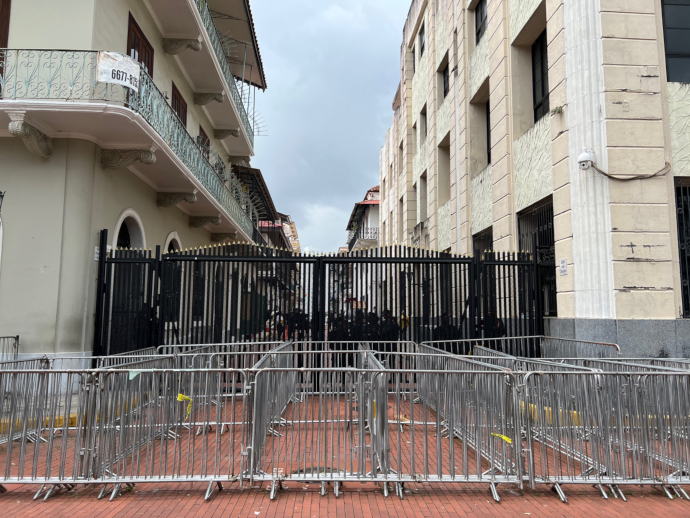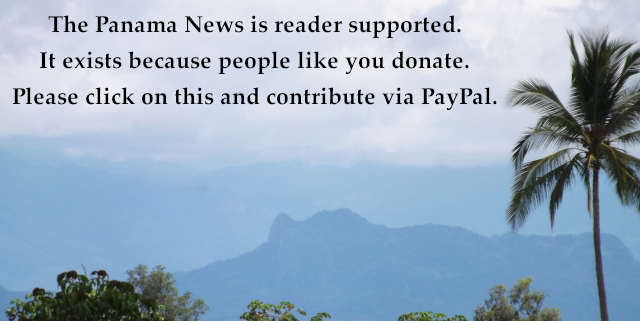Defensive barriers down the street from the Palacio de las Garzas. There were demonstrations in Santa Ana and then a gangster was slain and rival factions of maleantes took to the streets of El Chorrillo, Santa Ana and San Felipe intending to kill one another. The gang war and protests were unrelated, but the SPI presidential guards were not taking any chances. Photo from Sol Lauria’s Twitter feed.
The serious talks begin
In Penonome, with the Catholic Church as the facilitator, most of the labor unions and other organizations that have been protagonists in the protests that have stalled Panama for the past couple of weeks met to define their preferred agenda. There are still talks to take place among these forces before they are ready to sit down with the government, but their initial draft of an agenda of demands for talks with the government include:
-
Lower and freeze the price of fuel
-
Lower and freeze the price of energy
-
Lower the price of basic food staples without affecting farmers
-
Lower the price of medications
-
Allocate 6% of GDP to education
-
Discuss the Social Security Fund problem
-
Address corruption
-
Create an intersectoral monitoring group
Meanwhile, representatives of the Ministry of Government and the National Coordinator of the Indigenous Peoples of Panama (COONAPIP) ended a one-day indigenous strike with an agreement to enforce past agreements and court decision, most of all to honor protection of collectively-owned indigenous lands and resources. The specific immediate government commitment was to remove several groups of people who have invaded indigenous lands in the eastern parts of the country within two months. Administrative and judicial mechanisms to enforce old commitments to the seven indigenous nations, and the resources to fund these? Still to be discussed. The unsaid but very important upshot of the talks was that there would be no more of this government selection from among fractious Ngabe leaders and treatment of such persons as representatives of all of Panama’s original nations.
Other groups in society have weighed in on the crisis, many narrowly self-centered, a few with broader views and with varying degrees of wisdom. We can’t just blow off the specific concerns of those who drive or fish for a living and need to have affordable fuel. We can and should dismiss the demands of those foreign expatriates for brutal repression just like would be forthcoming if such protests happened in, say, Mississippi.
A voice of reason comes from group that’s not always so astute, the Chamber of Commerce. In a published statement, they opined that:
State resources belong to all of us, and we all deserve their best possible management. This includes the revision of the State Budget, the elimination of the recently approved tax incentives for tourism, the resignation of the rector of UNACHI and the approval of the law on conflicts of interest, just to mention a few.
Organized labor could not agree with business groups about what the minimum wage ought to be, let alone about the more militant unions’ demands for an across-the-board wage increase to make up for inflation’s ravages. However, you won’t get much disagreement from the strike movement when the Chamber advocates things like the above.
Also taking activist and observer roles in the crisis are many of the country’s professionals. Those folks have their divisions, and also self-interests such as keeping foreign professionals from working here. Especially in teaching and health care. many professionals are unionized here. Teachers’ unions at the forefront of the strike movement. The Federation of Professional Associations of Panama (FEDAP) has been weighing in on the crisis all along. They are for the protest and against both mob violence and brutal police repression. FEDAP says that the crisis is “provoked by worn-out political and economic models, as well as corruption.” The widening social inequalities, the destruction of institutions and the inflation crisis they see as symptoms of these provocations, and at the top of their agenda of solutions is an elected originating constitutional convention, one that is not only beyond the control of existing branches of government but which assumes the powers of the government branches.
~ ~ ~
With all that, we have the beginnings of a road map to negotiate a way out of the national crisis. But let us add:
-
Under the current economic model, we will go bankrupt if we try to make temporary concessions permanent. Food prices? In a neoliberal “free trade” economy where much of our food is imported? We’d go broke subsidizing imported rice for very long. Our public debt is already so high that in a certain sense we ARE broke.
-
The same conundrum applies to the prices of automotive fuels.
-
We may be a world and regional commercial and transportation hub and trade will always be part of our economy, but we need to think more about producing more of the food we eat and the energy we use. We need to do these things just to adapt to climate change anyway.
-
Subsidizing electricity generated by the sun, wind, rivers and tidal forces here makes much more sense than subsidizing imported fossil fuels. There will be a non-instant transition, especially from the internal combustion engine to electric vehicles.
-
Price controls on certain food staples have long been part of Panama’s economy and should remain so, but more important is investment in increased food production here. As in households growing more fruits and vegetables for family consumption. As in the protection and restoration and creation of mangrove forests and coral reefs that are at the base of our marine food chains, the creation of hatcheries for certain species of fish, and the diversion of some of SENAN resources from the failed US “War On Drugs” to the defense of our fisheries from poaching. As in growing more of our own rice. As in developing our food processing and packaging capacities to store or trade more of what we produce. Subsidies, direct state investments and price controls in those contexts make far more sense that trying to regulate international markets.
-
We really do need a new constitution, one in which economic models that protect narrow interests do not thwart democracy and sensible policy. One that protects fundamental rights, not some in-crowd’s privileges. One that allows for a Panama that’s both politically and economically non-aligned, even as we hold onto certain core national values and project those around the world through our diplomacy and our cultural exports.
~ ~ ~
Easier said than done, and impossible in an instant. But Panama can get out of this crisis. People from many sectors are coming together to point out the general direction in which we should move.
Alla Yaroshinskaya, the Ukrainian-Russian researcher and politician who investigated the health issues of the Chernobyl nuclear accident’s aftermath and ran into a wall of censorship. Right Livelihood photo.
Haste is good only in catching fleas.
Alla Yaroshinskaya
Bear in mind…
Tell your heart that the fear of suffering is worse than the suffering itself.
Paulo Coelho
Stop saying rest is a luxury or a privilege. It is not — it’s a human right… it gives us the space to embody and live in divinity.
Tricia Hersey
A great deal of intelligence can be invested in ignorance when the need for illusion is deep.
Saul Bellow
Contact us by email at fund4thepanamanews@gmail.com
To fend off hackers, organized trolls and other online vandalism, our website comments feature is switched off. Instead, come to our Facebook page to join in the discussion.
These links are interactive — click on the boxes













